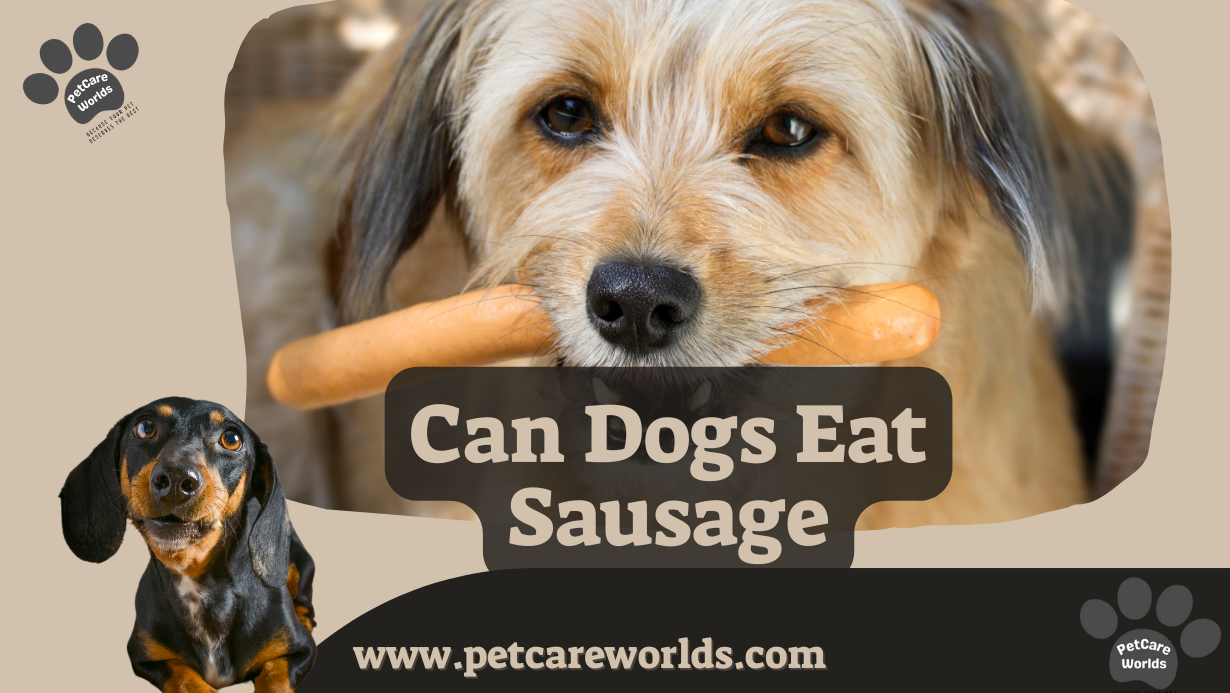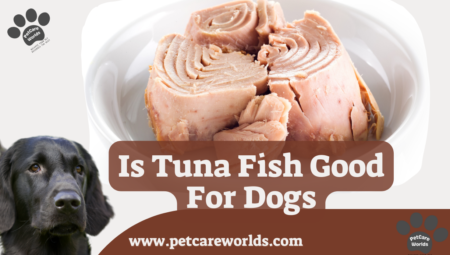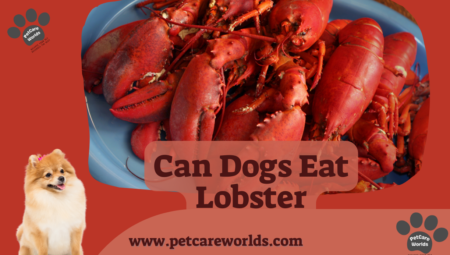Can dogs eat sausage? It’s a question many dog owners find themselves asking while sneaking a bite of their breakfast. Sure, those puppy eyes are hard to resist, but is sausage really a safe snack for your furry friend? While sausages might seem harmless, their high salt, fat, and spice content could spell trouble for your dog’s health. So, before you toss a piece of sausage to your four-legged companion, let’s dive into what’s inside this tempting treat and whether it’s worth the risk. Ready to uncover the truth? Let’s get started!
Can Dogs Eat Sausage?
Yes, dogs can eat sausage, but there’s a catch. While it’s not outright toxic, sausages are far from the healthiest choice for your pup. Most sausages are loaded with salt, fat, and spices, all of which can upset your dog’s stomach or lead to serious health issues over time. Can dogs eat sausage
Here’s what you need to consider:
- High Salt Content: Too much salt can cause dehydration or even sodium poisoning in dogs.
- Excess Fat: Fatty foods like sausage can lead to weight gain and even pancreatitis.
- Spices and Additives: Ingredients like garlic, onion, or preservatives are harmful and can damage your dog’s health.
If you’re thinking about sharing, stick to plain, unseasoned, and cooked sausage in tiny portions—and only as an occasional treat. Can dogs eat sausage
What’s in a Sausage?
Sausages may seem like simple snacks, but they’re often packed with ingredients that are unsuitable for dogs. Most sausages include a mix of meat, fat, salt, and spices, with added preservatives for a longer shelf life. While these are fine for humans in moderation, they can be harmful to your dog.
Different brands and types of sausages also include flavor enhancers, artificial colors, and fillers—none of which are dog-friendly. Understanding what’s in a sausage is key to deciding if it’s safe to share.
Key Ingredients to Watch Out For
Not all sausage ingredients are created equal. Some are harmless, while others can pose serious health risks to your dog. Watch out for: Can dogs eat sausage
- Salt: Excessive amounts can lead to dehydration or sodium poisoning.
- Fat: High-fat content can cause obesity or pancreatitis.
- Spices: Common seasonings like garlic and onion are toxic to dogs.
- Preservatives and Additives: Artificial chemicals may upset your dog’s digestive system or lead to long-term health issues.
Salt and Fat Content
Sausages are notorious for being high in salt and fat, making them unhealthy for dogs. Here’s why:
- Salt Problems: Too much salt can cause vomiting, diarrhea, or even seizures in severe cases. Dogs don’t need added salt in their diets.
- Fat Overload: Fat contributes to rapid weight gain and can lead to inflammation of the pancreas, a painful and dangerous condition.
Spices and Additives
Sausages often contain spices and additives that are toxic to dogs. Ingredients like garlic, onion powder, and chili can damage red blood cells or irritate the stomach.
Additionally, preservatives such as nitrates and artificial flavors may trigger allergic reactions or upset your dog’s digestion. Always check the label before letting your dog have even a small bite!
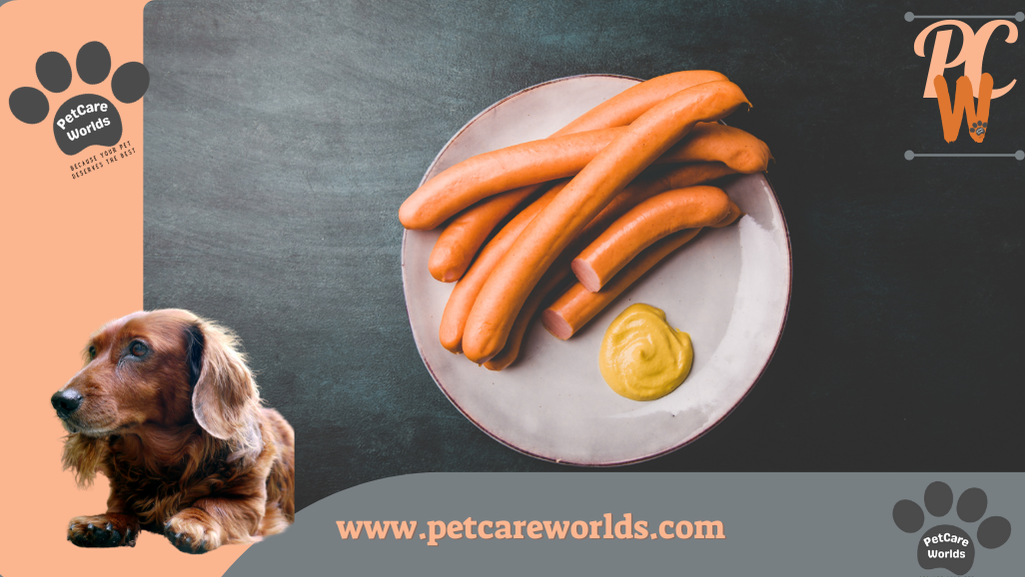
Risks of Feeding Sausage to Dogs
Feeding sausage to your dog might seem harmless, but it comes with risks. Sausage is far from a natural food for dogs, and its ingredients can lead to both immediate and long-term health problems. Here’s what you need to know: Can dogs eat sausage
- Digestive Upset: Dogs can experience vomiting, diarrhea, or stomach pain after eating sausage.
- Obesity Risk: High fat content contributes to unhealthy weight gain over time.
- Toxic Ingredients: Some sausages include harmful additives like garlic and onion, which are toxic to dogs.
Digestive Issues
Sausage can wreak havoc on your dog’s digestion, especially if eaten in large quantities. The fat, salt, and spices are often too much for a dog’s stomach to handle. Can dogs eat sausage
Common symptoms of digestive problems include:
- Vomiting: Dogs may regurgitate food shortly after eating sausage.
- Diarrhea: Rich, fatty foods can upset the stomach, leading to loose stools.
- Bloating: Excess salt can cause dehydration and bloating, making your dog uncomfortable.
Even a small piece can be enough to cause trouble, so it’s best to err on the side of caution.
Long-Term Effects
Regularly feeding sausage to your dog can have serious long-term consequences. High-fat and high-sodium foods contribute to chronic health problems, including: Can dogs eat sausage
- Obesity: Excess fat can lead to unhealthy weight gain, reducing your dog’s mobility and quality of life.
- Heart Problems: High salt intake increases the risk of hypertension and heart disease.
- Pancreatitis: Fat-heavy foods put stress on the pancreas, causing painful inflammation.
Choosing healthier treats and maintaining a balanced diet will help your dog stay happy and healthy in the long run! Can dogs eat sausage
Are Certain Types of Sausages Safer?
Not all sausages are created equal. While most are unsuitable for dogs, some options might pose fewer risks. Organic, additive-free sausages are safer but should still be offered sparingly.
When choosing a sausage, consider:
- Ingredients: Avoid sausages with garlic, onion, or excessive salt.
- Fat Content: Opt for leaner varieties to minimize health risks.
- Portion Size: Even “safe” sausages should only be a rare treat.
Organic and Additive-Free Options
Organic and additive-free sausages reduce exposure to harmful chemicals. These varieties typically lack preservatives, artificial flavors, and excess salt. Can dogs eat sausage
To ensure safety:
- Check Labels: Look for sausages with minimal ingredients.
- Cook Thoroughly: Avoid raw or undercooked options.
- Monitor Your Dog: Even organic treats should be introduced cautiously.
Puppies and Sausage
Puppies are more sensitive to human foods, including sausage. Their developing bodies can’t handle the rich ingredients and high salt content. Can dogs eat sausage
Why Puppies Are More Vulnerable
Puppies have delicate digestive systems and smaller bodies, making them more prone to issues like:
- Dehydration: Excess salt can lead to rapid fluid loss.
- Stomach Upset: Rich foods can overwhelm their digestion.
- Nutritional Imbalance: Sausage lacks the essential nutrients puppies need to grow.
For puppies, it’s best to avoid sausage altogether.
How to Offer Sausages Safely
If you decide to feed your dog sausage, follow some key guidelines to minimize risks.
Occasional Treats Only
Sausages should never replace regular meals. Treats like these are okay in moderation, but overindulgence can lead to health problems. Can dogs eat sausage
- Limit Frequency: Once a week or less.
- Control Portions: A small bite-sized piece is enough.
Safe Preparation Tips
The way you prepare sausage matters. To reduce risks:
- Cook Without Oil: Avoid frying to cut down on fat.
- Remove Seasonings: Rinse off spices or choose plain sausage.
- Serve Cool: Hot sausage can burn your dog’s mouth.
Healthier Alternatives to Sausages
Why risk it with sausage when there are plenty of healthier options for your furry friend?
Nutrient-Rich Snacks
Some snacks are both delicious and beneficial for dogs, such as: Can dogs eat sausage
- Carrot Sticks: Low-calorie and great for teeth.
- Apple Slices: Full of vitamins (but remove seeds).
- Cooked Chicken: High in protein and easy to digest.
Dog-Specific Treats
For a worry-free option, stick to treats made for dogs. These are designed to be:
- Nutritionally Balanced: They support your dog’s overall health.
- Easily Digestible: Gentle on sensitive stomachs.
- Safe: Free from toxic ingredients.
The Role of Balanced Nutrition
A balanced diet is key to keeping your dog happy and healthy. Sausage can’t compete with the benefits of proper nutrition. Can dogs eat sausage
Benefits of a Proper Diet
A diet rich in nutrients ensures:
- Strong Immune System: Keeps illnesses at bay.
- Healthy Weight: Prevents obesity-related issues.
- Shiny Coat and Energy: Reflects overall well-being.
Stick to vet-approved foods to provide the best life for your dog!
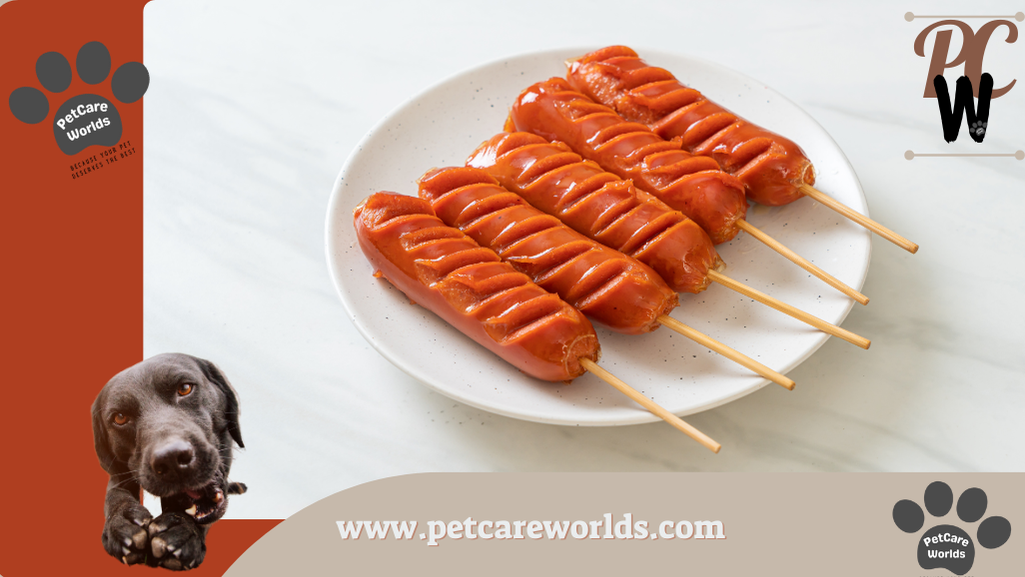
Can Dogs Eat Sausage Table
| Sausage Type | Safe for Dogs? | Risks | Recommendation |
|---|---|---|---|
| Regular Sausage | No | High salt, spices, and preservatives | Avoid entirely |
| Organic Sausage | Limited | May still contain high fat and salt content | Offer occasionally in small portions |
| Breakfast Sausage | No | High in fat, spices like garlic and onion | Avoid entirely |
| Chicken Sausage | Limited | Lower fat but may include harmful seasonings | Plain, unsalted only, in moderation |
| Pork Sausage | No | High fat and seasoning; difficult to digest | Avoid entirely |
| Turkey Sausage | Limited | Similar to chicken sausage, check for seasoning | Plain and additive-free only |
“Feeding your dog sausage may seem harmless, but even small bites can lead to digestive upset or worse. Choose healthier alternatives for your furry friend.”
Can Dogs Eat Sausage? – FAQ
1. Can I give my dog sausage occasionally?
Yes, you can give your dog sausage as an occasional treat, but only in small amounts and if it’s plain, free of spices, and low in fat and salt.
2. Is sausage bad for dogs?
Sausage is generally not recommended for dogs due to its high salt and fat content, which can lead to health issues like obesity, high blood pressure, and digestive problems.
3. Can puppies eat sausage?
No, puppies should not eat sausage. Their digestive systems are still developing, and the high fat and salt in sausage can cause serious digestive issues or even long-term health problems.
4. What should I do if my dog eats too much sausage?
If your dog eats a large amount of sausage, monitor for signs of vomiting, diarrhea, or lethargy. If symptoms appear, contact a vet immediately.
5. Are there safer alternatives to sausage for dogs?
Yes! You can provide your dog with dog-safe treats, like carrot sticks, apple slices (without seeds), or lean meats such as chicken or turkey, without spices or seasonings.
6. How can I prepare sausage for my dog safely?
If you choose to feed your dog sausage, ensure it is cooked thoroughly, and cut it into small pieces. Choose sausage that is plain, unseasoned, and low in fat and salt. However, offering sausages regularly is still not advisable.
Conclusion
Can dogs eat sausage? While dogs can eat sausage in small amounts, it’s not ideal due to its high salt, fat, and spices. Always prioritize healthier alternatives.


